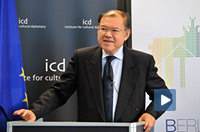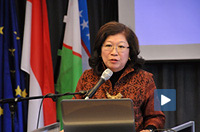The International Symposium on Cultural Diplomacy in Geneva 2012
"Cultural Diplomacy & Sustainable Development"

Introduction
 The world financial crisis of 2008 has influenced the economic agenda of leading governments and organizations and caused a series of important events ranging from the collapse of corporations to the failure of EU member states and the downgrading of various countries’ credit rating. These events forced significant austerity measures, which have affected the economic situation around the globe. Austerity measures have also had a social impact; there have been mass protests around Europe and the US calling for significant change and a more equal economic reality.
The world financial crisis of 2008 has influenced the economic agenda of leading governments and organizations and caused a series of important events ranging from the collapse of corporations to the failure of EU member states and the downgrading of various countries’ credit rating. These events forced significant austerity measures, which have affected the economic situation around the globe. Austerity measures have also had a social impact; there have been mass protests around Europe and the US calling for significant change and a more equal economic reality.Sustainable development of nations and regions is of particular importance during this period of economic turbulence in order to mitigate the effect of these economic crises on communities around the globe. The great challenge facing sustainable development in the context of austerity measures is that it is harder to divert funds to promote sustainable development, especially if there are unsustainable development options which are less expensive; sustainability is not necessarily a priority in these circumstances.
The International Symposium on Cultural Diplomacy in Geneva will be held parallel to the Rio+20 United Nations Conference on Sustainable Development and will focus on the importance of sustainable development to the future of developed and developing countries. The conference will offer perspectives on how cultural diplomacy policies can assist in strengthening existing and future sustainable development policies and, in particular, how cultural diplomacy practices are necessary to express and mediate the rationale behind investment in sustainable development during this challenging period.

Symposium Speakers »
Speakers during the conference will include leading figures and experts from international politics, academia, diplomacy, civil society and the private sector from across the world. These speakers will include a number of individuals from the ICD Advisory Board (for further information about the Advisory Board please click here).Symposium Participants »
Participation in the symposium is open to governmental & diplomatic officials, academics & scholars, economists, journalists, artists, civil society practitioners, private sector representatives, young professionals and students as well as other interested individuals from across the world.If you would like to reserve a position and participate in the symposium, please click on the "Apply Now" link below and fill out the online application form:
Certificate of Attendance
All participants will be awarded an official certificate of attendance upon completion of the program, which provides details about the speakers and topics at the conference. Each certificate will be signed by members of the ICD's Advisory Board.ICD Alumni Program »
All conference participants will be invited to join the ICD alumni program. The "ICD Alumni Group" is an international network of like-minded individuals with an interest in further developing the field of cultural diplomacy through the support of intercultural relations. Participation in the group is by invitation only, and is open only to individuals who have taken part in ICD programs. Members of the ICD Alumni Group will benefit from the following opportunities (more).Symposium Agenda »
Nearly a quarter of a century has passed since the release of the 1987 Brundtland report on sustainable development and there is still an increasing demand for standards and policies which promote sustainable development. The need for sustainable development is particularly significant at this point in time because of the global nature of the challenges facing our world. We currently occupy a world of immense economic upheaval; developed economies have been in crisis mode since 2008. At the same time, we are witness to the changing landscape of global wealth distribution, with the rapid emergence of the BRIC countries as new centres of economic and social development. Globalisation has dramatically reshaped national and regional economies, and it is in the interests of emerging economic powers to continue their self-sustained development. At the same time, the aftermath of the 2008 world financial crisis has inspired developed economies to search for a more balanced economic model with common policies which support more sustainable and inclusive economies. It is for these reasons that the root causes of unsustainability need to be examined, and the pace and depth of progress towards sustainable development analysed with a view to improving current approaches.The Symposium will focus in particular on the following Issues:
- Sustainable Development since the 2008 World Financial Crisis
- The Importance of Promoting Sustainable Development Standards & Policies
- Innovative Strategies for the Future progress & Success of Sustainable Development Policies
- The Role of Cultural Diplomacy in furthering Sustainable Development

































































































